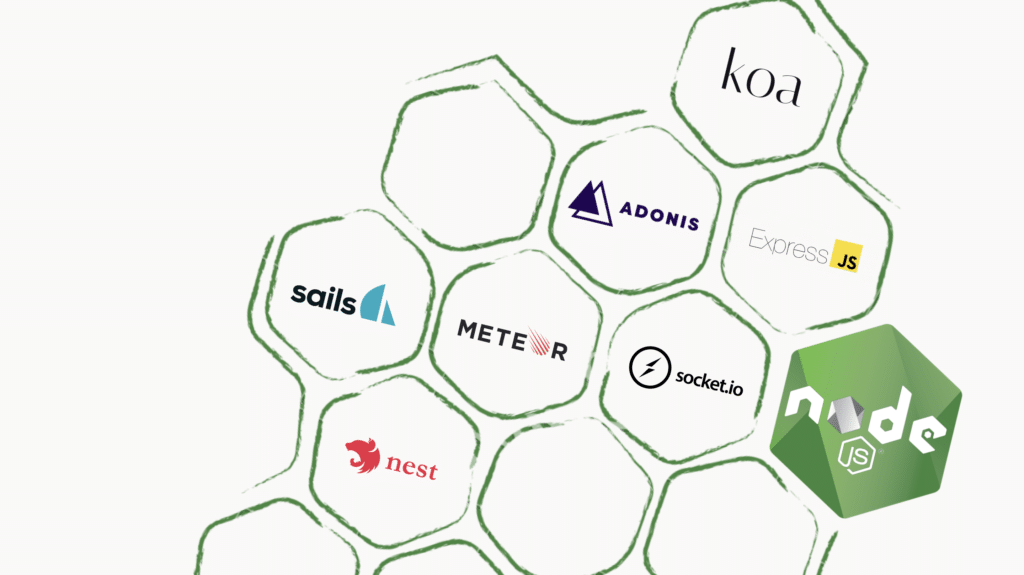Looking for the ultimate Node.js framework to skyrocket your project’s success? Here are the top 7 contenders you don’t want to miss in 2023.
Node.js, an open-source runtime environment built on Chrome’s V8 JavaScript engine, has emerged as a powerful platform for developing scalable, high-performance web applications. According to a survey from Statista, Node.js emerged as the most widely used backend JavaScript runtime environment in 2022, with 47% of developers reporting its usage.
One of the reasons for its popularity is the ecosystem of frameworks and libraries surrounding it, offering developers a wide range of options to streamline their development process and boost productivity.
However, choosing the proper Node.js framework for your project can be overwhelming with so many options available. To help you navigate the dynamic Node.js ecosystem, we will delve into the best Node.js frameworks so that you stay updated on the latest trends in the field.
Node.js framework’s varieties
Node.js offers a variety of frameworks catering to different use cases in web application development. Some common types of Node.js frameworks include:
- MVC Frameworks: These frameworks follow the Model-View-Controller architecture, dividing the application into models (data), views (user interface), and controllers (logic). They provide a structured approach for building scalable and maintainable applications.
- Full-Stack MVC Frameworks: These frameworks combine front-end and back-end development capabilities, allowing developers to create end-to-end web applications. They offer features like template generators, staging environments, and integrated tooling for streamlined development.
- REST API Frameworks: REST API frameworks focus on building robust and flexible APIs for client-server communication. They provide a framework for creating RESTful APIs, enabling smooth data exchange between client and server applications.

Top 7 best Node.js frameworks
Express.js
¨ – Why did the Node.js developer invite Express to their party?
– Because he knew Express would handle all the routing and make sure everyone got to the right endpoint!¨
Express JS finds its purpose as a backend server framework and often complements frontend technologies like React and Angular. The versatility of Express offers a rich set of features that include support for cookies, sessions, templates, and seamless integration with databases. Besides, its extensive collection of plugins and middleware further improves its functionality, making it a popular choice among developers.
Express.js boasts approximately 60.6K Github stars and 10.4K forks, serving as a testament to its widespread acclaim and popularity. Thanks to its lightweight and modular architecture, the framework facilitates the development of microservices and serverless architectures. This unique design empowers developers with seamless customization options and simplified deployment processes, making Express a go-to choice for efficient and scalable application development.
Meteor JS
Meteor, the JavaScript framework, simplifies the creation of sophisticated online applications by seamlessly working on both the client and server sides. Its built-in features, like real-time updates, database management, and front-end rendering make complex app development hassle-free. The active developer community adds to its functionality through plugins and packages.
With data synchronization, security, and mobile development features, Meteor enables developers to build robust and efficient applications swiftly. This well-maintained framework has garnered approximately 43K Github stars and 5.3K forks.
Sail.js
Sails.js is a versatile and lightweight framework following the MVC architecture pattern, similar to Ruby on Rails. It supports various databases and seamless integration with JavaScript frameworks. With its flexible code policies and compatibility with npm modules, Sails.js enables the efficient development of customized applications. It uses Express for HTTP requests and Socket.io for WebSockets, offering a frontend-agnostic-backend platform for time-saving API sharing.
Nest.js
Nest.js is a popular open-source framework for building scalable and efficient server-side applications with Node.js. It is built on top of Express.js and inspired by Angular’s architecture and concepts. Nest.js uses TypeScript, providing the benefits of static typing and enhanced tooling.
The framework follows a modular structure, promoting code organization into reusable and maintainable modules. Key features include dependency injection, decorators, and middleware for building robust and extensible applications. Nest.js emphasizes the use of decorators to define routes, middleware, and application behavior. It offers a powerful command-line interface (CLI) for scaffolding and generating code.
Nest.js integrates seamlessly with other libraries and frameworks, leveraging the extensive Node.js ecosystem. It provides built-in support for WebSockets, GraphQL, and testing frameworks like Jest.
Socket.io
Socket.io is an exceptional full-stack framework renowned for its ability to build fast and reliable real-time applications. It is a robust solution that facilitates bidirectional event-based communication, making it ideal for applications requiring instant updates. One of the standout features of Socket.io is its comprehensive support for various essential functionalities. It seamlessly handles auto-reconnection and disconnection detection, ensuring a reliable connection even in challenging network environments.
Moreover, Socket.io supports binary data transmission, multiplexing (allowing multiple logical channels over a single physical connection), and the concept of rooms, which enables efficient group communication.
Socket.io boasts a user-friendly and intuitive API, enabling developers to work easily and efficiently. It ensures compatibility across multiple platforms, browsers, and devices, focusing on both reliability and speed. This versatility makes Socket.io an excellent choice for full-stack development, empowering developers to create real-time applications that deliver seamless, interactive experiences.
Adonis.js
Adonis.js is an MVC Node.js framework inspired by Laravel, focusing on reducing development time and providing essential features such as web socket support, built-in modules for mailing, validation, authentication, and Redis. It offers an organized structure and dependency injection and is suitable for developing faster web applications with JSON responses, full-stack web app development, and compatibility with Node.js frontend technologies.
Koa.js
Koa is a powerful Node.js framework for creating web services like APIs. It simplifies API development with a stack-like approach to handle HTTP middleware. Koa.js has 1.5 million weekly downloads, showing its popularity. One key feature of Koa is normalizing Node’s limitations. It enables easy user content management, such as translations and personalized eCommerce, all with the same URL.
Similar to Express, Koa offers flexible coding, reducing complexity and errors. With 34K Github stars, Koa.js is well-maintained by a dedicated community.
Bottom line
Selecting the ideal Node.js framework for your project from our Top 7 choices hinges on multiple factors. One more important consideration is to opt for frameworks that are best for full-stack development requirements. Express.js, Meteor.js, and Nest.js stand out as notable examples.
These frameworks boast features and functionalities needed for empowering developers to build end-to-end applications seamlessly. By choosing a framework that excels in full-stack development, you can ensure a cohesive and efficient development process while leveraging the strengths of these standout options.
To make an informed decision, evaluate required criteria like project needs, scalability, team expertise, community support, and performance benchmarks. Thoroughly assessing these factors will guide you in pinpointing the most suitable Node.js framework for your specific project.






